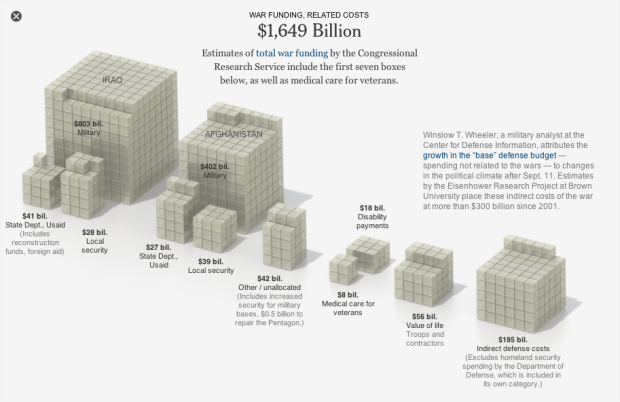This Sunday will be 10 years since the attacks on September 11. Amanda Cox and Shan Carter of The New York Times look at the financial tally, an estimated $3.3 trillion:
Al Qaeda spent roughly half a million dollars to destroy the World Trade Center and cripple the Pentagon. What has been the cost to the United States? In a survey of estimates by The New York Times, the answer is $3.3 trillion, or about $7 million for every dollar Al Qaeda spent planning and executing the attacks. While not all of the costs have been borne by the government — and some are still to come — this total equals one-fifth of the current national debt. All figures are shown in today’s dollars.
A single cube in each stack represents $1 billion. The initial view is money spent in five categories. Click on any stack for a subcategory breakdown. Sobering.
[New York Times via @shancarter]



generally, the past few visualizations from NYT have been very helpful & insightful. I generally love it when people take the time to visualize these massive numbers that otherwise are unimaginable. …but I can’t help but to think this ends up being a very biased visualization in light of the overall scheme of governmental spending. Let’s give equal time to things like: “Pork barrel” spending of things deemed irrational; spending derived from added line items to bills that have nothing to do with the intent of the bill; tackle the tougher bigger portions of the spending pie charts like Medicare & social security, spending that was wasted, or hidden debt responsibility of the American public through bank bailouts, auto bailouts, insurance bailouts, Freddie Mac, Fannie Mae, or Ginnie Mae. or everything else that’s not listed.
Again, not to entirely discourage visualizations where it’s needed; but that it seems to strike a nerve when visualizations do a poor job of giving the “bigger picture” of spending …or the hidden costs, debts, liabilities that goes far-far beyond just money.
I think this is an effective visualization. I’m troubled by the editorial decision to include the cost of the Iraq war in the graphic, though. The Iraq war had nothing to do with Al Qaeda’s attack on 9/11 other than some very public misdirection (including in the NYT). Why include its $800B? Adding it bolsters their conclusion “it is clear that it was the nation’s response, rather than the damage from the attacks, that accounts for the bulk of the cost,” but it accepts the argument that Iraq was a response to 9/11.
I think they are assuming that we wouldn’t have invaded Iraq if 9/11 didn’t happen… That is a valid assumption given how much the Bush administration tried (and failed) to link Saddam with al qaeda.
Consider this. None of that money was paid for by spending cuts elsewhere or increased revenues.
Now republicans are insisting on offsetting disaster relief funds for hurricanes, floods and wildfires with spending cuts elsewhere, yet most of them voted for literally trillions in increases to the national debt without ever considering how to pay for it. The mess was passed on to Obama and now they blame him for all of the debt. Incredible.
I think it’s a useful graphic, but anyone else noticed the labels on the subgroups are the wrong way round?
41 vs 28 bil and 27 vs 39…
A large part of this cost is actually just money moving from one US tax-payer to another, i.e. it essentially remains within the US economic system. The government uses taxes to buy war-related products and services, employ workers in war-related jobs, etc. So I disagree with the “Al Qedia got 7,000,000% ROI” perspective presented in the article: it suggests that for every dollar spent by Al Quedia the US government just burnt $7million, which obviously isn’t quite the case.
The story is the opportunity cost – i.e. the US has spent a lot of money on one thing instead of another more valuable alternative. The cost of missed opportunities is for Americans is ponder over, as you watch China overtake.
(All of the above ignores the human cost of war. I think we would all agree that this is the most important aspect of all)